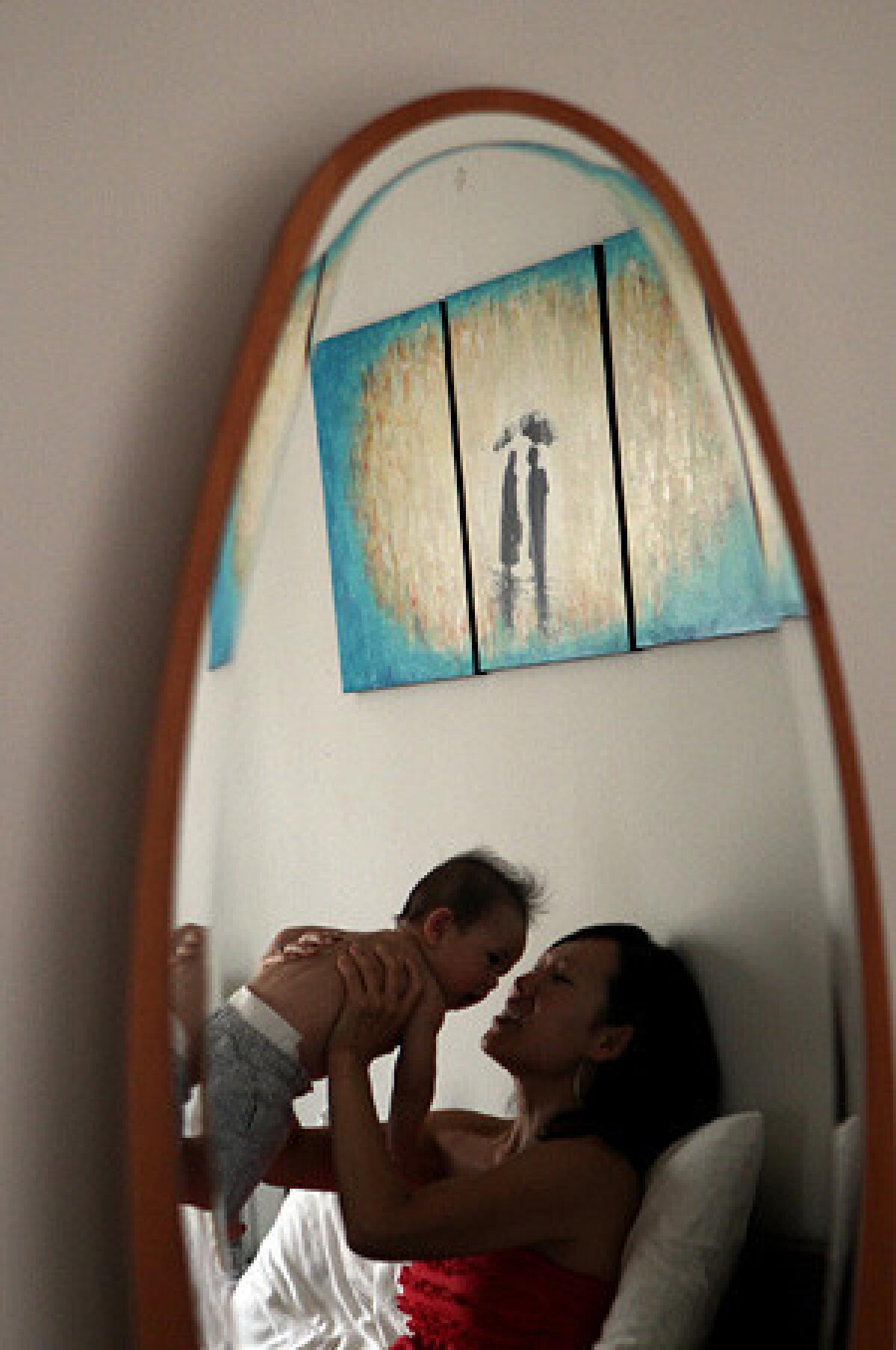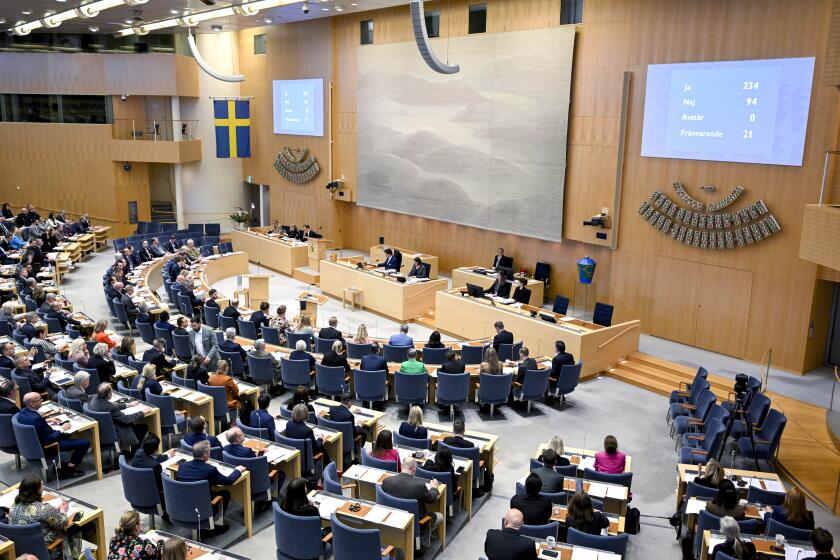Abandoned as a baby, she gets a priceless gift

I do not know what clothes I was wearing. Whether I’d been left in a cradle or with any note of explanation. I do not know if I cried or lay still. Looked around or slept. Minutes may have gone by. Or hours.
All the official record says is that, at about 2 months old, I was abandoned at the Nambu police station in Busan, South Korea.
Labeled a “foundling,” I was taken to a countryside orphanage and given a birth date and a name -- Dong Hee Ahn. It was 1978.
After a year and a half, I was transferred to a foster home in Seoul, where a social worker noted:
Her all action development progress was slower than same aged children due to being cared at orphanage for long.
I discovered that faded, typewritten assessment years after being adopted by an attorney and a real estate agent in Cedar Rapids, Iowa, when I was 2. As a teenager, I would take the papers from my mother’s desk drawer without asking and pore over them when the house was quiet.
Stark and awkward in their translation, the words were oddly comforting.
She takes rice and many other side dishes every meal time and especially likes meat, fishes and dislikes radish.... She visits her neighbor friend, gets fear a little with new one. She does simple errands, enjoys playing with toys. She likes bathing, is mild and introvert.
For a while, my adoption case history was enough, proof of an existence not remembered.
But when my son was born in October, the world shifted. Time, money, love -- all now were funneled through the prism of one 8-pound boy. It was as others had warned: Sacrifice and tenderness were only abstract ideas before.
With this new joy, this light, however, came the troublesome image of abandonment: Motherhood had made my early life harder to understand.
I now knew firsthand that you can miss a child who is sleeping, breathing softly, right in the next room. Those descriptions of my early years suddenly seemed lonely and void of affection.
I had been housed, but did not have a home.
Adoptees universally are told their biological parents adored them so much that they offered them up to a better life. It is a nice theory, one that has no trace of ugliness.
But even under the best of circumstances, abandonment leaves wounds.
In the fall of 1980, my new parents drove 250 miles to meet my plane in Chicago. Having adopted a Korean boy two years earlier, they were delighted to receive a girl. After an anxious wait, they finally laid eyes on a girl with wispy, dull hair who wore a red sweat shirt and a frown. They threw their arms around her.
She stood still, vacant. She had not learned how to hug.
“You were just like a doll, your arms only dangled,” my mother would tell me later.
Cautious and quiet, I refused at first to engage with my older brother. At age 2, he had been left in front of a children’s home in Korea, holding a box of cookies and a piece of paper with his name on it. “Please find a good family for me,” it read.
As a kid he clung to our father, fearful of being left again. He was eager to be comforted, wanting to cuddle and talk. He befriended anyone and everyone, needing a constant community.
I was different. Throughout the years, I trusted only a few friends at a time. After moving to Los Angeles, I met an extrovert whose self-confidence was intriguing. But the permanence of marriage frightened me even after I had said the vows.
While pregnant, I worried that the difficulty I had bonding hinted at a problematic future. I was afraid I would see this baby as an outsider.
I dutifully read the maternity books, but stopped when they moved past birth and into infant care. It was too peculiar a notion to wrap my head around. Babies are a foreign concept when your family photos and stories begin with a toddler in America.
“What if I don’t love it?”
I asked my husband at least once a week. My parents had preached devotion to family, but I was still the daughter of people who had walked away. Perhaps detachment was in my nature.
When my water broke the morning of my due date, I sobbed. I wasn’t ready.
But that delirious night in the recovery room, the bassinet seemed to emit a warm glow. I marveled at the swollen red face, the round head, the shock of black hair; he was healthy and robust, but as small as my two hands put together.
“You’re mine, you’re mine, you’re really mine,” was all I could think to say. Giddy and blithe, I faded off to sleep.
With my son’s arrival came something magical: a blood relative I could hold on to.
Family, I know, is not about genes. When you are born in Asia and raised by white Midwesterners and have nine cousins with blue eyes and fair skin, you learn that families can be cobbled together.
But adoptees must believe in the power of biology. What else ties us to our mothers, our fathers, who left us decades ago? Shared biology allows us to tell ourselves that someone out there still longs for us, still weeps for us, still dreams we will figure out how to get home. We yearn for these shadowy figures and the answers only they can reveal.
At the heart of it, though, is the simplest of things. It would be nice to know someone who looks like you.
Those first months as a mother, I searched for my own features in my son’s face. We shared deep brown eyes and inky hair, but no distinctive characteristics. “He looks Asian,” said a friend, “but he doesn’t look like you.” I snapped hundreds of photos, but had none of my own to compare them with.
Then a few weeks before my first Mother’s Day, while cleaning out my desk, I happened upon a forgotten black-and-white image: Perched on her foster mother’s lap is a girl wearing a cap and a checkered wool outfit, just days away from settling in another land, another language.
Chubby-cheeked and full-lipped, she looks timid and bewildered. I knew that look.
I laughed, then cried, then cried some more.
The face is vaguely my son’s. And in that moment, I understood that in him are echoes of my birth mother, my birth father.
In all these years, I have never searched for them, believing it would prove fruitless. Yet somehow they have found their way here.
My boy doesn’t look like me. He looks like us.
Pharris is 6 months old now, shedding real tears when we part. Every morning that little face gets so scared and sad.
I pretend not to notice as I chat with the two women who run the day care facility, give instructions about feeding and naps, greet other children -- all to show him that this place is fine, that he is OK.
And that I will return.
I find that I am touched by my son’s cries. They make me wince, but also give me a feeling that is strange and lovely. For he is my proof that a girl left behind who could not hug, could not fathom loving a tiny stranger, has managed to forge the strongest of bonds.
To him, I feel like home.
--
More to Read
Start your day right
Sign up for Essential California for news, features and recommendations from the L.A. Times and beyond in your inbox six days a week.
You may occasionally receive promotional content from the Los Angeles Times.







